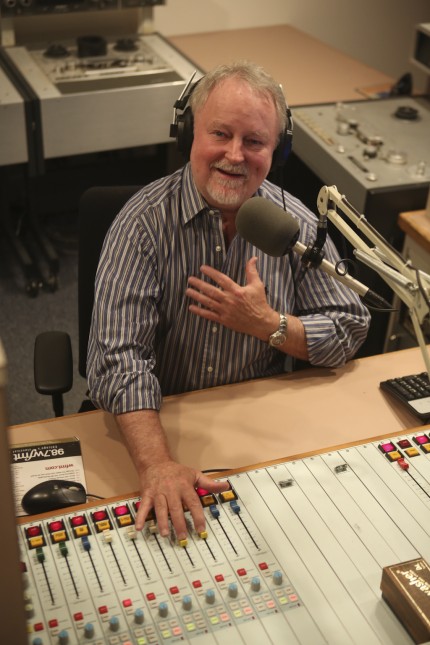Radio’s Bill McGlaughlin delights in making waves for classical music

Bill McGlaughlin recording “Exploring Music” at WFMT studios last year.
In an episode of his radio show, Exploring Music with Bill McGlaughlin, the host seeks to explain tempo and its role in Beethoven’s music. But he begins the show by talking about Bach.
In the episode, titled “Beethoven and that Danged Metronome,” McGlaughlin plays two recordings of the Aria from Bach’s Goldberg Variations, both performed by pianist Glenn Gould. The first recording, from 1955, is twice as fast as the second, from 1981.
“Did you hear that tempo?” McGlaughlin asks, a kind of folksy wonderment in his voice. “It’s so slow. It’s a dream.”
He continues to ruminate on why Gould, who rarely left his home at that point in his life. played the famous Aria so painfully, excruciatingly and beautifully slow.
“To me, he’s like a collector, taking this beautiful piece of art, and holding it up to the light, examining every facet…You can’t do that in real time.
“That’s not a performance in the regular sense,” says McGlaughlin. “It’s an act of love.”
McGlaughlin’s own act of love isn’t a performance, but his classical music radio show. For nearly a decade, he has served as host of Exploring Music, a show that explores the history of, showcases and dissects classical music. The show is broadcast on 55 radio stations around the country, reaching about 400,000 listeners each week. But with the show’s new website, exploringmusic.wfmt.com, listeners will have more options of ways to listen to, and interact with, the show.
“Our most frequently asked question was, ‘How do I listen to the show on my own time?’” McGlaughlin said, in a phone interview.
The new site is an answer to that question, an attempt to get listeners to interact with the show and with each other, and a resource of over 850 hours of material that the site’s creators hope will be used by music teachers and other educators.
While the show is produced in Chicago, McGlaughlin lives in New York, and records the show at the studio of New York City-based classical radio station WQXR. He does much of the research for the show at the New York Public Library for the Performing Arts, where, he said, he frequently bumps into the limit of being able to take home only 30 books and scores at a time.
“I need a camel,” McGlaughlin said. “One time I got so many books that the librarian said ‘Oh honey, I hope you’re taking a cab home.’”
McGlaughlin records each show without a script, although the show isn’t live, so he has the option of multiple takes. “It gives a feeling of spontaneity, a gee-wiz feeling,” said executive producer Steve Robinson, who is also WFMT’s executive vice-president and general manager. McGlaughlin devotes five hours—a week of the show—to each theme, which range from composers (Chopin, Nielsen, Bach Sleeps in on Sundays) to musical forms (The Symphony, It Takes Two to Tango, Wind Quintets) to the less-definable (New Wine in Old Bottles, Don’t Shoot the Piano Player, Too Darn Big).
The website currently has about 700 annual subscribers. A yearly subscription to Exploring Music costs $50, monthly access costs $7, and access to a five-hour show costs $2. The site also offers a student rate. The first seven minutes of each show are available for free.
“We’ve learned that people have a real thirst for knowing more about classical music,” said Robinson. In the past ten years, the show has received about 10,000 emails, ranging from someone who didn’t know what a string quartet was to a Juilliard graduate, he said.
On a discussion board on the new site, listeners posted comments about what they think McGlaughlin should or shouldn’t be covering. While the comments are overwhelmingly positive, those that aren’t, or request particular composers or pieces, show an audience that is engaged, opinionated and—regardless of their knowledge level—passionate.
“I usually look forward to your show each week night, but after an entire week of Wagner last week, I just can’t stomach any more Wagner this week, and won’t be listening,” wrote a listener who identified herself as Gwen S. “A whole week was too much already!”
“I’m not sure if you’ve done a program on Chopin recently, but a program of great piano virtuosi would be tight,” commented the self-identified Tyler Fluegel. “I don’t particularly dig Liszt, but throw the dude in for good measure.”
McGlaughlin has a long history of engaging with classical music in various capacities: including as a trombonist with the Pittsburgh Symphony and Philadelphia Orchestra, a composer, associate conductor with the St. Paul Chamber Orchestra, stints as music director in Eugene, Tucson, San Francisco and Kansas City, and regular guest-conducting gigs. For 27 years, he was the host of public radio program Saint Paul Sunday.
McGlaughlin said he doesn’t have a favorite show or theme. But Robinson, the producer, has a particular affinity for the week focused on Copland.
“There was a moment where he plays the Piano Variations,” recalled Robinson. “It’s kind of a gnarly piece. The piece ends, and he plays this mashed-up chord. He says, ‘Copland kept this in his notebook for years. Does it sound at all familiar to you? What if I play it one note at a time?’
“As he’s playing it, you hear the opening of Appalachian Spring. It takes your breath away.”
Listen to Exploring Music with Bill McGlaughlin at exploringmusic.wfmt.com. Subscriptions cost $50 annually, $7 a month, or $2 a week, with student pricing available. The show is also broadcast on radio stations around the country, listed here.
Posted Jul 17, 2013 at 10:09 pm by Abigail Wrenn
I love your program. Can I buy any of your tapes?